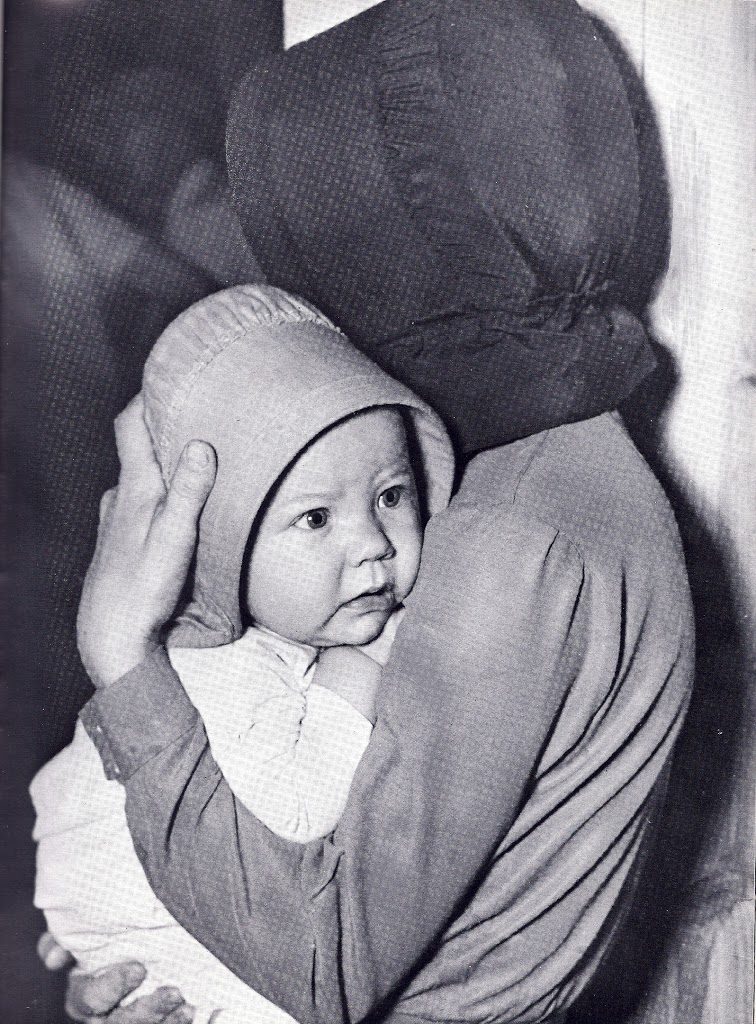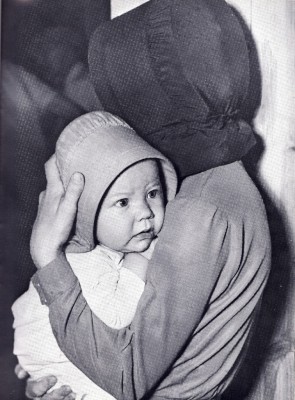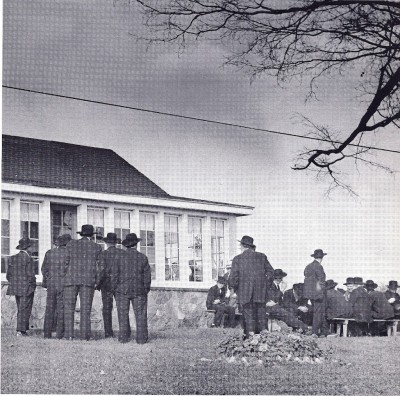Kristina asked: What is the one thing that you would most like to convey to people, about the Amish, to those who are interested in or are praying for them?
Kristina, this is rather a tough question, because there are many things I want to convey about the Amish. David made a remark to someone at a book talk today, when he said, “Saloma likes to complicate people’s view of the Amish.” This is true in many ways — I do want people to know that the Amish cannot possibly live up to the romanticized view that many people have of them. But there are also some things that I truly admire about them.
Erik Wesner had asked a question on his blog the other day about whether Amish life is inherently more dangerous than that in the mainstream culture and he wrote about a tragic accident in which a baby died from falling out of a buggy. I think that the answer is yes, life among the Amish is more dangerous. But the Amish worldview is different about life in general — most Amish I know accept death as part of life. They see everything — even tragic accidents — as God’s Will. Because of this, they do not “settle in” to this life quite as comfortably as the mainstream culture. Rather, they see each day on earth as a gift granted by God. At first blush, this may seem like a cavalier attitude toward physical safety. However, the Amish don’t seem to take life for granted as much as the rest of us tend to. In some ways, this makes them more resilient and self-reliant. If there is a tragedy, the community pulls together and they help each other out. So, rather than put their energy into making life “safe” they seem to be ready for whatever comes their way. There is strength in that, albeit a different kind than we normally recognize.
I have come to the conclusion that taking something for granted is exactly the opposite of being grateful for something. I think the Amish can teach us something about being grateful for our lives and about accepting tragedy and death as part of life. Having said that, I cannot imagine going through what the parents of that 11-month old baby must be going through. I’m sure they could use our prayers.
Thanks, Kristina, for your question.
Kristina, this is rather a tough question, because there are many things I want to convey about the Amish. David made a remark to someone at a book talk today, when he said, “Saloma likes to complicate people’s view of the Amish.” This is true in many ways — I do want people to know that the Amish cannot possibly live up to the romanticized view that many people have of them. But there are also some things that I truly admire about them.
Erik Wesner had asked a question on his blog the other day about whether Amish life is inherently more dangerous than that in the mainstream culture and he wrote about a tragic accident in which a baby died from falling out of a buggy. I think that the answer is yes, life among the Amish is more dangerous. But the Amish worldview is different about life in general — most Amish I know accept death as part of life. They see everything — even tragic accidents — as God’s Will. Because of this, they do not “settle in” to this life quite as comfortably as the mainstream culture. Rather, they see each day on earth as a gift granted by God. At first blush, this may seem like a cavalier attitude toward physical safety. However, the Amish don’t seem to take life for granted as much as the rest of us tend to. In some ways, this makes them more resilient and self-reliant. If there is a tragedy, the community pulls together and they help each other out. So, rather than put their energy into making life “safe” they seem to be ready for whatever comes their way. There is strength in that, albeit a different kind than we normally recognize.
I have come to the conclusion that taking something for granted is exactly the opposite of being grateful for something. I think the Amish can teach us something about being grateful for our lives and about accepting tragedy and death as part of life. Having said that, I cannot imagine going through what the parents of that 11-month old baby must be going through. I’m sure they could use our prayers.
Thanks, Kristina, for your question.





I never realized just how dangerous riding in a buggy is until I moved away from all Amish communities and then went back to Holmes County for a visit. The buggies are just a bit of wood and oil cloth, with a spirited horse pulling it. Cars and trucks come up behind them and people have no car seats for their children, nor any seat belts. I mean they are just right out there in the most likely spot to get run over. But their attitude is “You the truck driver need to be more careful…”
Saloma,
Good Morning! I cannot imagine the loss felt by the parents of the 11 month baby; remembering God’s will often is a hard challenge for me, often coming to the act of selfishness on my part. I do admire the Amish strength and fortitude.
Blessings,
Debbie S.
In terms of physical safety, I think it’s important to remember that ALL of our ancestors once lived as the Amish still do. Although I do feel safety is important, and am grateful for the many modern inventions that help protect us (seat belts, for example), I also think that we now live in a world where many are overly cautious and when an accident happens are quick to look for someone or something to blame. I know young parents who worry about their children playing in open sandboxes & grandparents who won’t take their grandchildren to a park for safety concerns. I understand their reasoning, but I also think there are trade-offs when we try to protect too much. Life is inherently dangerous and death is a part of it. In some ways, perhaps the Amish are better equipped to deal with this reality than many of the rest of us are.
As usual, THANKS Saloma, for your gracious and thoughtful post.
Thank you for taking the time to answer our questions. I realize that “Amish fiction” is just that…fiction. Just like any other fiction, in my view. It’s just that people seem to want to focus on the romanticizing of the Amish. Maybe because it’s a different culture?. I don’t know.
And I can’t imagine losing a child to any accident like that. In a way, it’s good that the Amish look as death as a part of life. We can learn many things from them and be grateful for all that we have. But I wonder if they need to learn to be more “safety conscious.” I don’t know. I’m not Amish, but I have seen many, many accidents similar to this lately.
Im not really sure how many more ways an Amish buggy can be made more safer other than what is being done now. The bodys are only made of mostly wood. Richard from the Amish settlement of Lebanon county.